Step-by-Step Instructions
- Randomly distribute one We Connect Card to every person in your group.
- Ask everyone to form a pair by seeking another person holding the same coloured card.
- Invite these pairs to share their responses to the questions on one or both cards.
- When ready, instruct each person to swap cards and find a new partner to repeat the process.
- Continue playing for up to 10 minutes and/or try a variation.
Buy We Connect Cards
Resources
Here’s a quick introductory video to learn more about these wonderfully versatile cards:
Order Now
Video Tutorial
Video Transcript for We Connect Cards
presented by Mark Collard
It took me until my 40s until I found my soulmate, but I’m going to make it really, really simple for you. And that is just to look at the sole of your feet, look for one other person who has the same sole as you. Go.
Find one other person. All right. Perfect, Caleb.
You can be over here. All right. Everyone’s got themselves a partner.
Anyone not got a partner? All right. So, to quickly identify who in your partnership has a special role, I’m going to ask you to have a quick 10-second conversation with your new best friend and identify which of the two of you loves chocolate more than the other. Go.
All right. Very good. That should be long enough.
Bring your attention back to here. Just take half a step in. Come in a little bit closer.
Hey, I know if I had a partner, on this occasion I didn’t, but if I had a partner and they started with, I know I’m going to win because if you have to think about it, you can’t be as big a chocoholic as I am. So, please raise your hand if you’re a chocoholic like me and enjoys chocolate. Yeah, I’m not.
You’ve got a special role in your partnership to step forward and grab any two cards, but be sure the two cards you pick are different colours. Go. Any two cards.
So share one of your cards with your partner, won’t matter which one, you won’t have it for very long. So you would notice as a 3D object there are two sides to this. Don’t worry about the stick figure at this point, but you’ll notice on the other side there is a question.
And this is how the next few minutes is going to look. In the beginning you’ll start with your current partner and perform a task that I’m about to describe. And at the end of that you’ll swap cards and then go find another partner to repeat that process.
If you happen to be particularly athletic or competitive, probably what you heard me say was, do this as quickly as possible. No, just do it several times, but I don’t want you to dwell with someone for 20 minutes either, because here’s how it looks. For example, if Caleb and I were partners, one of us, doesn’t matter who, will start by asking the question on the card.
And here is the key, that if I ask the question, Caleb can answer it any way he chooses. Having responded in any way he chooses, it’s then his turn to ask the question of me. Guess what? I get to respond to this question any way I choose.
At the end of that exchange, it might take a minute, maybe a little longer, doesn’t matter, swap cards and then shoot off, look for somebody new. If you have your hand in the air with the card, it just indicates you’re looking for a new partner. It won’t matter who that person is.
With a group this size, if you come across someone you’ve already shared with, you’re going to have two different cards. So you have something new to share. So don’t be concerned about integrating with someone that you’ve already shared with, you’ll have something new.
Got the basic idea? And go! .
How To Play Narrative
These cards are one of my all-time favourite resources for inviting interaction, sharing and connection. There are so many ways to use them, so I’ll share the generic set-up here and invite you to browse some of the many variations below.
Having shuffled the cards (there’s 60 in a pack) randomly hand one card to each person. If they ask, and they often do, it’s okay to look at it 🙂
Use an interesting technique to form random pairs, such as one of the strategies described in Getting Into Pairs or announce something as simple as “Find someone who is holding a card of the same colour” (there’s green, blue and purple.)
Announce that over the course of the next 10 to 15 minutes, you would like every one to interact and have a conversation with as many different people in the room as possible, without racing, it’s not a competition.
For every partnership formed, each person will ask the question on their card to invite a response from their partner. Critically, this partner is entitled to answer the question in any way they choose, which of course, includes not answering at all, or answering in a way that makes them feel comfortable.
Then, having answered, this person will ask the question on their card, and so on.
If both people want to answer each question, that’s cool, but it’s not necessary because of what happens next.
When the conversation has ended, instruct each person to swap cards with their partner and then find a new partner with whom they have not yet had a conversation with. And the sharing continues.
If interaction, sharing and connection are what you’re looking for, then this is what you can expect. If you group is looking for more, take a look at something new described in the Variations tab.
Practical Leadership Tips
Honouring choice is a key ingredient of the success of playmeo’s programming success, so I highly recommend you embrace the language around how one may respond to a question when they are asked. In the case of We Connect Cards, there are few if any cards that I would ordinarily expect could threaten someone, but you can never know for sure. So, for some, hearing you say that they have complete control over how they respond can be as powerful as much as a refreshing change.
A deck of We Connect Cards comes with 10+ activities you can use that will (as they proudly state on the box) inspire infinite connections.
The cards are categorised broadly into three groups:
- Green – simple questions that are fun and light
- Blue – questions that are a bit deeper
- Purple – questions that encourage self-reflection
You can get your own set (or three) of We Connect Cards here.
Social-Emotional Learning
You could integrate We Connect Cards as part of a well-designed SEL program to develop your group’s ability to understand the perspectives of and empathise with others including those from diverse backgrounds and cultures.
Specifically, this activity offers ample opportunities to explore and practice the following social & interpersonal skills:
Self-Awareness
- Identifying Emotions
- Linking Feelings, Values & Thoughts
- Identifying Personal, Cultural & Linguistic Assets
- Recognising Strengths, Prejudices & Biases
- Demonstrating Self-Confidence, Honesty & Integrity
- Experiencing Self-Efficacy
Social Awareness
- Taking Other’s Perspectives
- Demonstrating Empathy & Compassion
- Understanding & Expressing Gratitude
- Appreciating Diversity
- Recognising Strengths In Others
- Respecting Others
Relationship Skills
- Communicate & Listen Effectively
- Seeking and/or Offering Support
- Build Positive Relationships
- Demonstrate Cultural Competency
Responsible Decision-Making
- Demonstrating Curiosity & Open-Mindedness
- Making Reasoned Judgements
- Promoting Personal & Collective Well-Being
You can learn more about SEL and how it can support character education here.
Health & Wellness Programming
Behavioural Norms
The opportunities to engage in multiple episodes of interaction and sharing make this exercise (not to mention the cards) ideal for programs that aim to explore and develop social and interpersonal skills.
Meeting and mixing with people in an effort to establish positive and healthy relationships is such a critical function of any group’s development. To this end, this exercise could frame many discussions about, for example, what is acceptable or not acceptable when people meet each other for the first time. For example, you could introduce this ice-breaking exercise for the following purposes:
- Observe, study and understand the variety of social cues people demonstrate and express when responding to a question;
- Observe how different people navigate different social situations and explore why;
- Identify opportunities for responsible decision-making, eg showing respect to all people; and
- Discuss the importance and benefits of connecting with other people.
Popular Variations
- Can You Do This? Find a random partner and teach them the physical activity featured on your card and vice-versa. Then swap cards, seek new partners and repeat.
- Random Mixing: Use the cards to invite lots of random mixing such as:
– Find a partner who is (or is not) holding a card of the same colour.
– Find all of the people holding the same colour card.
– Find a partner who is (or is not) holding a card featuring the same physical activity.
– Find all of the people holding a card featuring the same physical activity
- Conversation Roulette: Split into 2 or more teams and distribute an equal number of green cards (fun & light questions) to each of them. Each team is challenged to flip over one card at a time inviting every one of their team members to answer the question as quickly as possible before flipping the next card. The first team to flip over all of their cards wins.
- Sixty Removal: Lay all 60 cards (or less) on a table and ask anyone in your group to remove any one or more cards that they think they could answer for the whole group. Once these type of cards have been eliminated from the pile, you can use the rest of the questions as you choose.
- Quick Colour Debrief: Lay all of the cards on a table. Based on how each person is feeling, invite everyone to take one card from the pile that is purposefully green (light & fun,) blue (a bit deeper,) or purple (self-reflective.) Ask your group to hold up their card and note the majority preference. This result will give you a clue as to how your group is feeling.
- Got No Cards? No trouble – simply visit Icebreaker Question Exchange and download dozens of very similar questions from the Resources tab to create your own set of cards, for free!
- Take a look at Mirror Neurons to enjoy another very active partner matching experience that speaks to the way our brains like to mirror the actions and feelings of others.
- Take a look at Poker Swap to enjoy another highly interactive icebreaker that invites deeper connections.
- Take a look at We Engage Cards which combine famous quotes and evocative images.
Virtual Adaptation
- Happily, the folks at We & Me have produced a free deck of We Connect Cards for virtual programs. Click here to view them. If you do integrate them into your online programs, be sure to attribute them appropriately.
- Otherwise, invite your virtual audience to respond to a series of question cards you show via webcam, either in the chatroom or by turning on their microphone.
You Might Also Like...
We Engage Cards
Thought-provoking series of cards to inspire engagement.
 3
3
Names Stock Market
Highly interactive card game to learn names quickly.
 1
1
Commonalities
Team icebreaker activity to discover surprising group connections.
Useful Framing Ideas
Carl Sagan, a famous astronomer and scientist, was known to have said that we make our world significant by the courage of our questions and the depth of our answers. This next exercise leverages this thought in a really fun and engaging way…
One of the reasons I think people groan at the thought of icebreakers and lame get to know you questions is that they are, er, pretty boring. Not today. I have a deck of cards in my hands that I’m about to share that I expect will inspire you to go beyond the usual boring icebreaker questions and actually enjoy the conversation…
Reflection Tips & Strategies
Coupled with one or more reflection strategies, here are some sample questions you could use to process your group’s experience after playing this engaging get-to-know-you game:
- What did you discover in this activity?
- What words would you use to describe the atmosphere of sharing just now? Why?
- Do you think this type of sharing is important? Why or why not?
- What was the question that elicited the most interesting response?
- What makes a good ice-breaker question?
Program Templates
Fun & Energetic ‘Get-To-Know-You’ Session
What You Need:
12+ people, 30 mins, deck of We Connect Cards
- Crosstown Connections – to generate lots of safe, non-threatening interaction
- One Two Three – hilarious partner exercise to generate lots of laughter
- We Connect Cards – sequence of simple paired & small group activities that invite interaction and sharing
Highly Interactive ‘Icebreaker’ Session
What You Need:
12+ people, 30 mins, deck of We Connect Cards, deck of playing cards
- Clumps – series of short, sharp instructions to invite lots of random interactions
- We Connect Cards – sequence of paired & small group activities that invite interaction and sharing
- Playing Card Mixers – more opportunities to invite random interaction and sharing
Source
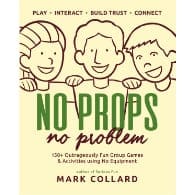
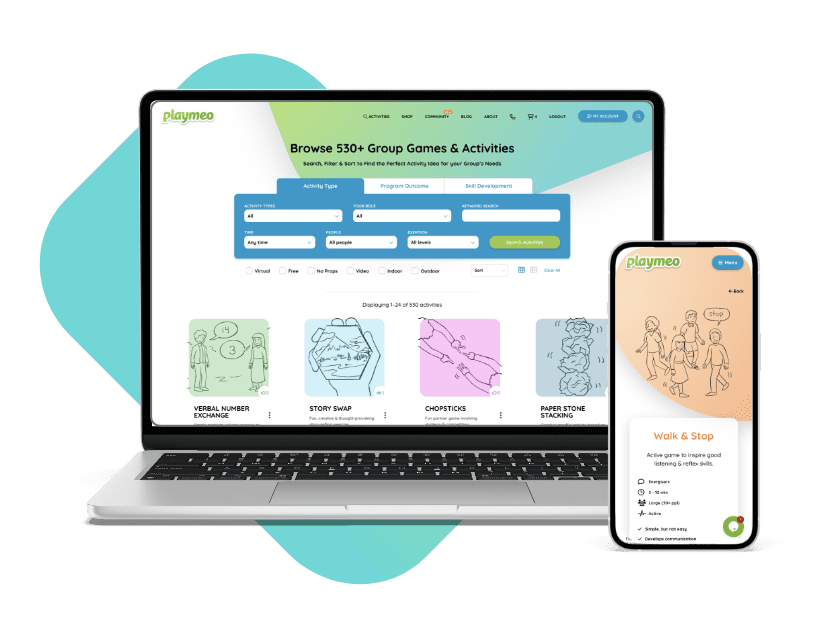





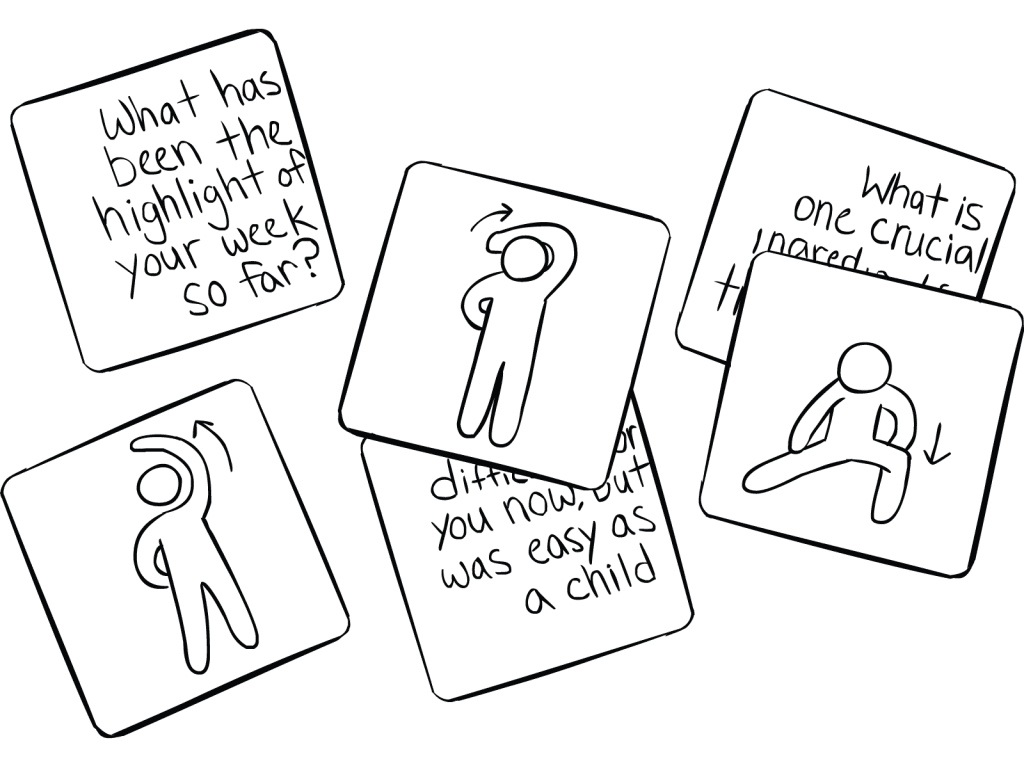



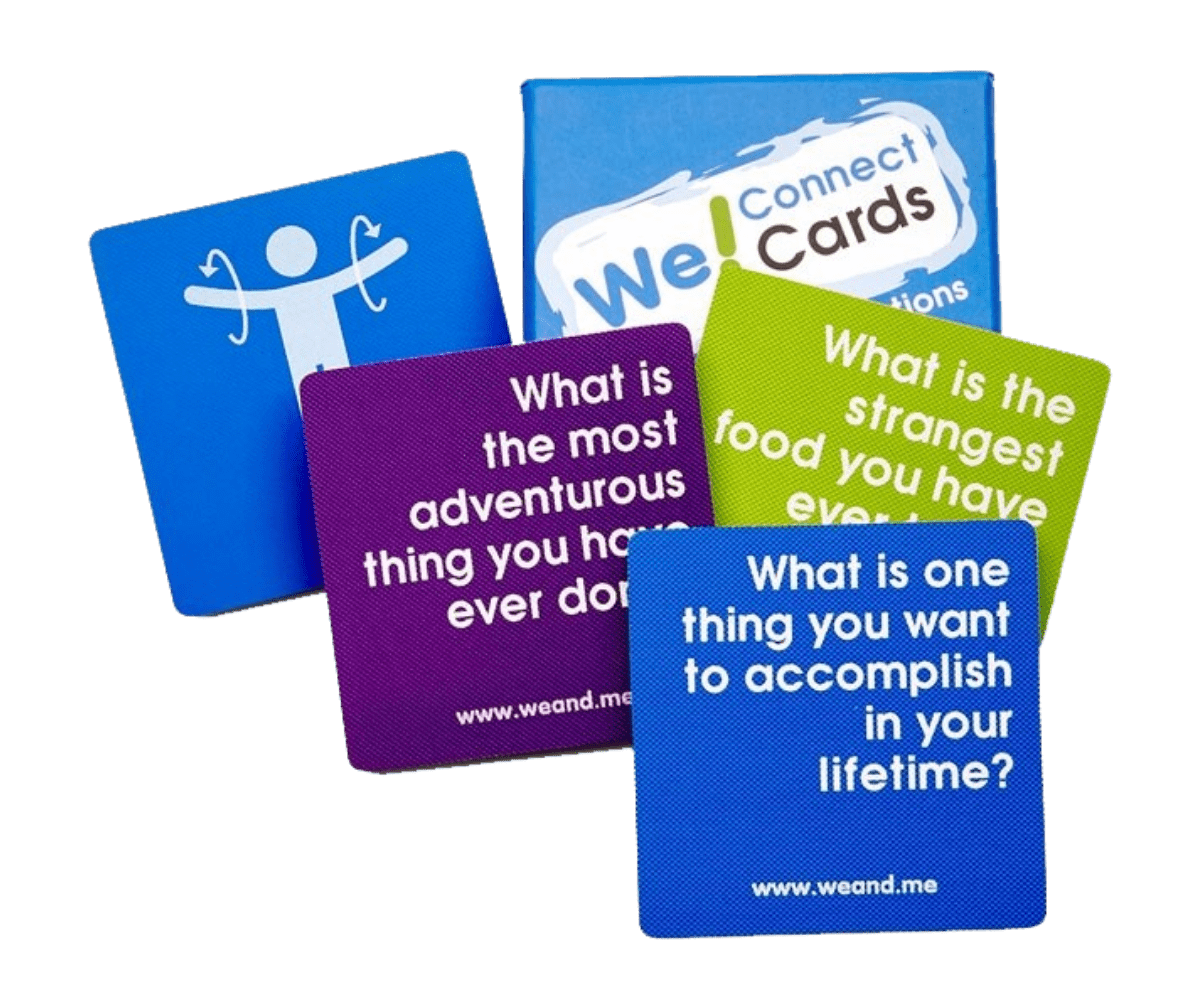
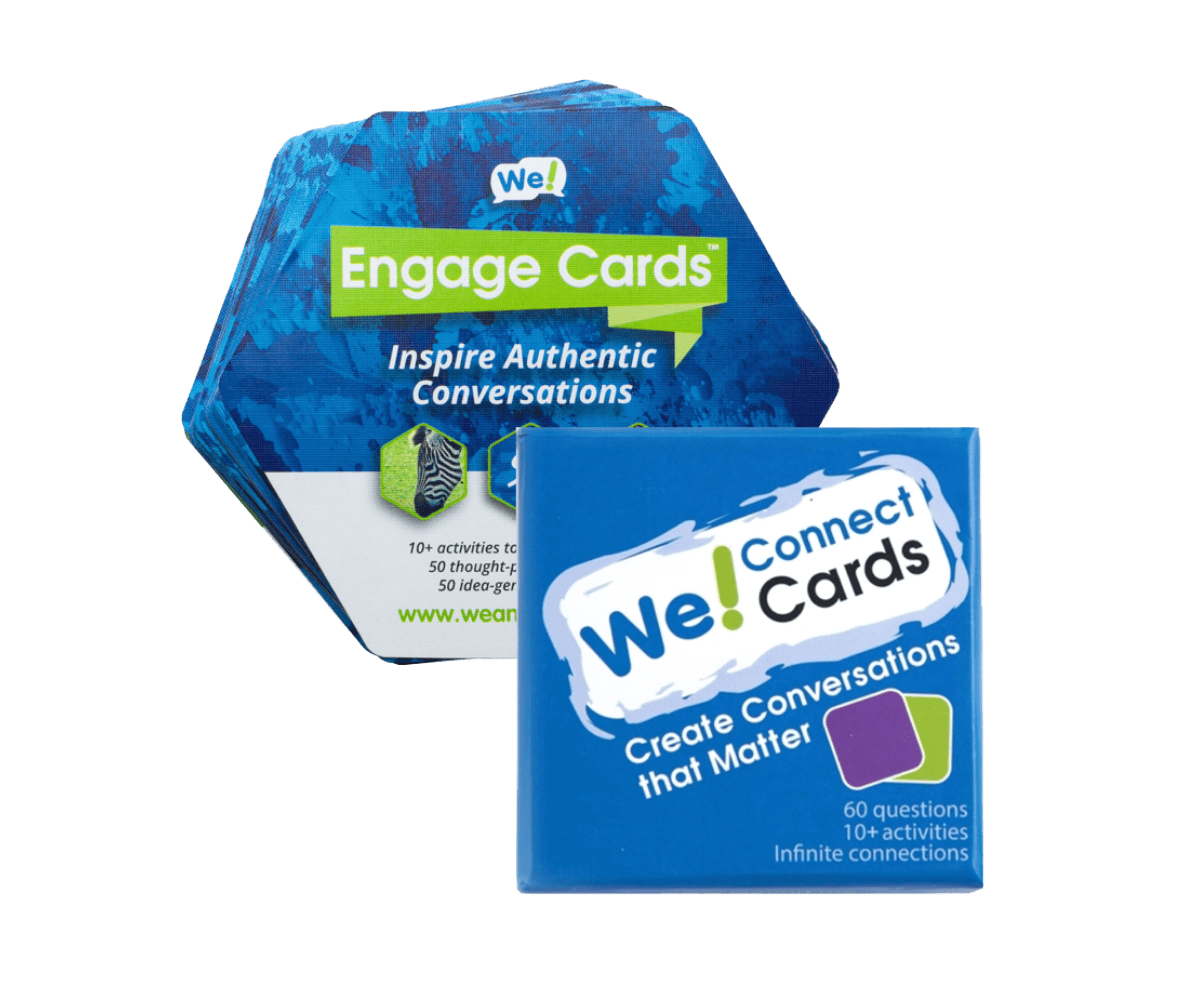



Add your Comments...
Have you played this activity? What worked, what didn't work? What type of group? Do you have useful advice for other users? Do you know a fun variation?